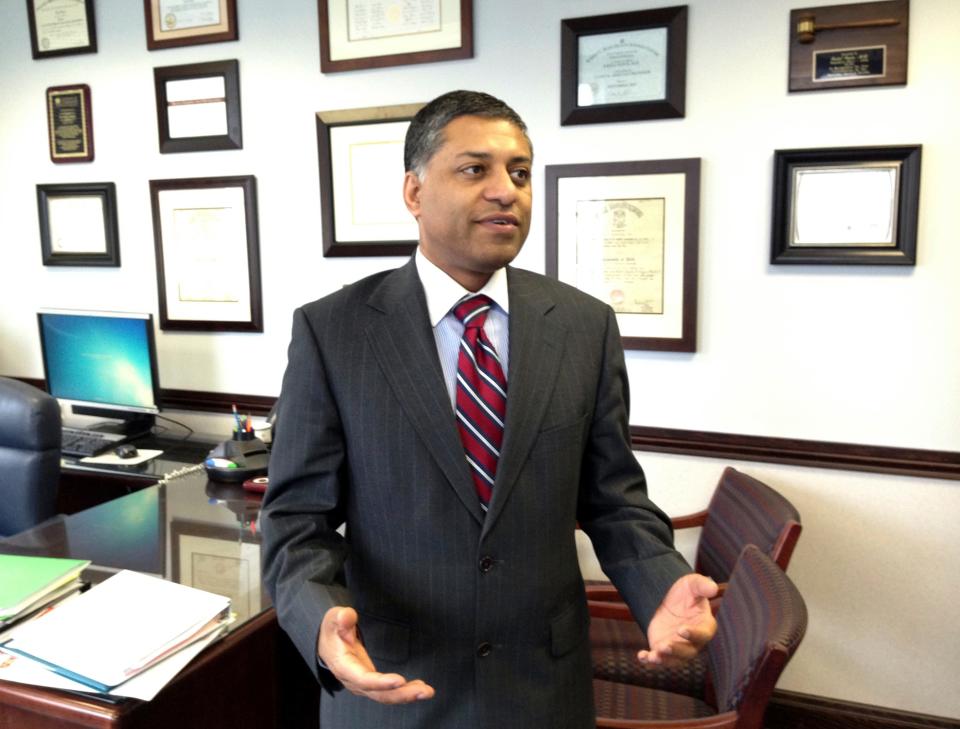An accidental overdose killed our son. Biden chose the right person to fight this epidemic.
It’s hard to tell what delayed President Joe Biden’s nomination for Director of the Office of National Drug Control Policy for six months, but he has made a terrific choice.
We asked Dr. Rahul Gupta to serve on the board of our non-profit group, SAFE Project, for same the reasons he will excel in his new role. He is an empathetic team player with strong bipartisan credibility and hard-earned experience as the public health director in our nation’s hardest-hit state, West Virginia. Congress needs to move quickly on his nomination. Regina LaBelle has done an excellent job as Acting ONDCP Director, but there is nothing like having a Senate-confirmed person in this important role.
And there is much that needs to be done. Our nation’s epidemic of drug overdose fatalities has worsened dramatically for two reasons. Highly toxic, illegally imported fentanyl – the drug that killed our son – has made its way into nearly every type of street drug. And the epidemic has been amplified due to the mental health impacts of isolation, uncertainty, and anxiety that accompanied COVID-19, which exacerbate one’s susceptibility to substance dependence.
Overdose death toll may be higher
These twin factors led to a 30% increase in fatalities in 2020. Unlike COVID-19 statistics, which are reported daily, the Centers for Disease Control and Prevention only reports overdose fatalities six months after a period ends, which is an indication of how poorly the seriousness of this disease is treated. Indeed, the numbers from the most recent 12 months could be even worse than the 93,000 fatalities reported last week.
Dr. Gupta realizes there is no single lever to pull that will overcome this crisis. Rather, there are six broad categories of overdue action we need to take.

First, we must raise public awareness of the true dimensions and nature of this disease in order to gain popular support for the measures required to defeat it. Such awareness will also help overcome the epidemic’s public enemy number one: stigma.
Second, we need more focus on full spectrum prevention, which involves, among many other actions, credible voices speaking candidly to the most vulnerable people: our middle and high school kids.
Third, medical and dental professionals must place far greater emphasis on responsible prescription and disposal of opioid mediations, and we need more widespread availability of the life-saving drug naloxone and craving-reducing drugs like buprenorphine.
James Winnefeld III: I shouldn’t have been ashamed of my brother. Eliminate the stigma around opioid addiction.
Fourth, resolving this crisis will demand more justice actions focused on those distributing the drug rather than those dependent on it, as well as better border interdiction technologies, more widespread use of drug courts, more treatment for those incarcerated, and greater efforts to cooperate with -- and where necessary enforce accountability on -- supplier nations. This must include far greater attention to interdicting fentanyl and its many variants, which has evolved into the real killer in this crisis.

Fifth, those struggling with this disease must have quality access to treatment and recovery resources, including regimes that last long enough to allow the brain to really begin to recover.
Finally, we must do more to help families and friends who are helping a loved one cope with the disease, as well as addressing the underserved communities that are most vulnerable to this disease. As most of these levers are interrelated, we have to pull every one of them nearly perfectly, or we will not succeed. This requires the kind of leadership Dr. Gupta will provide.

While progress depends to some degree on our amazing fellow non-profits operating in this space, ONDCP must be granted the power required to enable government to do its vital part. There’s an old saying in the military that if everyone is responsible, then no one is responsible. The budget, policy and convening authority required to overcome a crisis of this magnitude is best exercised from a cabinet level position, but President Biden has chosen to not elevate it to that level. While that is not optimal, we can still overcome this scourge as long as Dr. Gupta benefits from strong, frequent and visible support from the president and his domestic policy adviser, Susan Rice.
Bipartisan fight against fentanyl
Congressional support is also vital. The exceptional cooperation between the Congressional Commission on Synthetic Fentanyl Trafficking co-chairs, Republican Sen. Tom Cotton of Arkansas and Democratic Rep. David Trone of Maryland, represents a rare and promising example of the bipartisan partnering required to solve many of our bitterly divided nation’s most intractable problems, including this one. We need more of this.
Recognizing symptoms: We thought we knew what drug addiction looked like. Then our nephew died in our house.
However, potentially the most formidable obstacle to this important work is institutional ego. The non-profit world is largely past this. The many organizations toiling in this space are simply trying to save lives, usually driven by the desire to spare other families our own painful personal experience. It’s time for government organizations to firmly set all such previous behavior aside. Interagency actions in the wake of 9/11 are worth studying in this regard. Law enforcement and the intelligence community overcame their differences and came together like never before in response to those attacks.
Opinions in your inbox: Get the best insights and analysis every morning
The slow-moving catastrophe of addiction fatalities is killing far more Americans, and requires even broader interagency coordination. Let’s give Dr. Gupta the authority and the resources he needs to make that happen. His collegial brand of leadership and sage advice will be as invaluable to our nation as they have been to our organization in the fight to overcome America’s drug overdose epidemic.
Retired Admiral James A. Winnefeld and Mary Winnefeld lost their son, Jonathan, to an accidental overdose. They are the founders and co-chairs of SAFE Project, a non-profit organization working to reverse the addiction fatality epidemic. Dr. Rahul Gupta is a board member of SAFE Project.
You can read diverse opinions from our Board of Contributors and other writers on the Opinion front page, on Twitter @usatodayopinion and in our daily Opinion newsletter. To respond to a column, submit a comment to letters@usatoday.com.
This article originally appeared on USA TODAY: COVID and fentanyl are driving up overdose deaths. Confirm Gupta ASAP.

 Yahoo Movies
Yahoo Movies 
